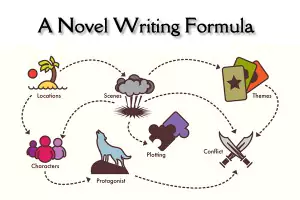
✅ AI Essay Writer ✅ AI Detector ✅ Plagchecker ✅ Paraphraser
✅ Summarizer ✅ Citation Generator
Hi everyone!

Many of you most likely have dreamed about writing a novel, but did not know where to start. I will not try to comfort you by saying that “writing a novel is a piece of cake—just follow the guidelines, and you’ll be OK.” In fact, no guidelines—even the most accurate and numerous—will make you a writer. But what they can do is to show you where to apply your effort, and how to organize the writing process.
The guidelines I offer you work fine for me—I am saying this, because there is no ultimate recipe for writing. Check out the following steps, and see if you can use any of these tips in your own writing life:
1. Although I know many writers who first start writing a novel, and then see what genre or size it turns out to be, I am the opposite: I prefer to decide on the genre and approximate size of my novel first. If you are commercially oriented, you might also want to consider your target audience.
2. Depending on the genre, you will have to choose between different settings. Generally, setting is a place, time period, and environment in which the events of your novel take place. The easiest way is to have a setting correspond with the genre; for example, a sci-fi plot develops in space, fantasy, in some kingdom, and drama, in a modern city. But you can also combine settings or mix them; for example, you can write a great sci-fi novel only in an urban setting without mentioning space. Settings can greatly influence plots.
3. Create a list of main characters, and mark the relationships that connect them. Of course, as you will be writing your novel, their relationships will change; also, new characters will appear, and some characters will fade away. But anyways, you need something to start with, right?
4. Here comes my favorite part: chalking out the novel. By chalking out, I mean planning what is going to happen in each of the chapters. Usually, I describe the key events, turning points, and plot-defining actions of characters—all in a couple of brief sentences. This is going to be the backbone of your novel. The plan may change as you write the novel, but once again—you need a starting point and an approximate roadmap.
5. Write the first draft of your novel, and do not try to make it perfect.
6. Edit. I have seen a blog post about editing on this website, and anyways, I am planning to write one myself, so I will not describe the details here. Just remember that dreaming to write a good novel from the first attempt, without editing, is an unattainable utopia.
When writing a novel, you may (and will) find yourself in situations when you lack specific knowledge. If you don’t care about sounding credible, that’s not a big problem; however, a mature writer always seeks to be competent in what he or she writes about. So, do not hesitate to do research whenever you feel you are not sure about something.
The rest depends on your skill and will. Have a good time writing!
Follow us on Reddit for more insights and updates.




Comments (0)
Welcome to A*Help comments!
We’re all about debate and discussion at A*Help.
We value the diverse opinions of users, so you may find points of view that you don’t agree with. And that’s cool. However, there are certain things we’re not OK with: attempts to manipulate our data in any way, for example, or the posting of discriminative, offensive, hateful, or disparaging material.